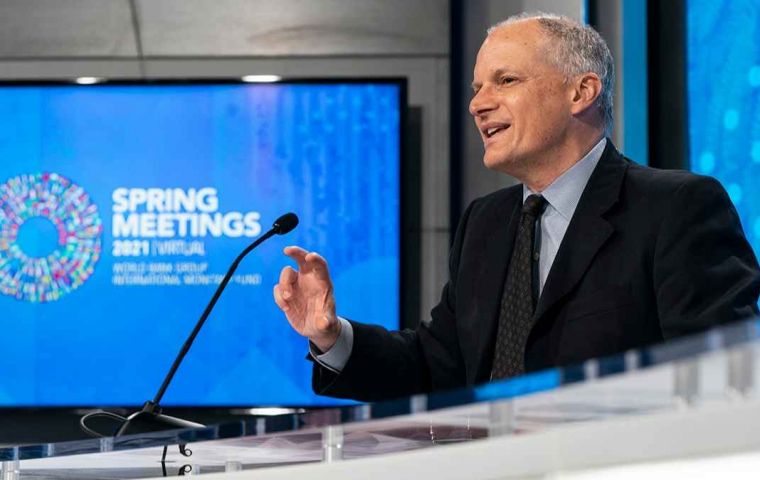MercoPress. South Atlantic News Agency
Covid-19 deals 10-year setback to Latin America income levels, IMF top official says
 Werner said the main challenge will be to achieve growth that includes health, education and the fight against poverty
Werner said the main challenge will be to achieve growth that includes health, education and the fight against poverty The International Monetary Fund (IMF)'s Director of the Western Hemisphere Department Alejandro Werner has said that the current coronavirus pandemic will result in a 10-year setback to the income levels of the region.
Werner also believes “the delay in vaccination campaigns made the first half of the year a little less dynamic” in Latin America.
The IMF expected that the combination of vaccination campaigns, the strong economic recovery in the United States and China, the rise in commodity prices, and low international interest rates “would help the recovery in Latin America in the second half of the year,” where growth is at this point estimated to be “between 4.5% and 5%.”
Hence, ”we are still going to be below the level that was before the pandemic (7%). Therefore, lags will accumulate in the social area, in the area of poverty,“ Werner explained.
”The level of per capita income in 2025 is probably similar to what we saw in 2015, which also shows a problem of worsening poverty, of deterioration in income distribution,“ the official elaborated in an interview published in an IMF blog.
According to Werner, although the recovery in the region began to be noticed already during the second half of 2020, ”the delay in vaccination campaigns has meant that perhaps the first half of the year is a little less dynamic than we thought” would be.
Three months ahead of his leaving his post at the IMF (he will resign on August 31), Werner said that the main challenge for the region will be to achieve growth that includes “a strengthening of social policies in the areas of health, education and to support the fight against poverty to improve the social situation.”
Werner added that “this will also require that in the fiscal and financial sphere important measures be taken to strengthen public finances: as we emerged from the pandemic with high levels of debt and deficits, as the economy gets back to normal, it will also be necessary for public finances” to follow suit.
The official also said the IMF had evolved over the last 20 to 30 years and thus changed its approach to economic crises “The IMF has moved to think about the concept of macroeconomic stabilization as a broader concept, in which it is not only enough to stabilize financial variables, but also to protect and improve certain social indicators, even during processes of macro-financial stability.”
“The concept of macroeconomic stabilization is being seen as a broader process which incorporates a set of policies beyond those strictly fiscal, financial and monetary,” he added, because if the social aspect is cast aside, “it is very difficult to maintain macroeconomic stability to eventually reach an inclusive growth process.”
Werner also hoped the IMF would be “able to provide the financial support required for these programs to be implemented, even in a possible context of volatility in international financial markets, given the great uncertainty about how the world economy will be.”




Top Comments
Disclaimer & comment rulesCommenting for this story is now closed.
If you have a Facebook account, become a fan and comment on our Facebook Page!